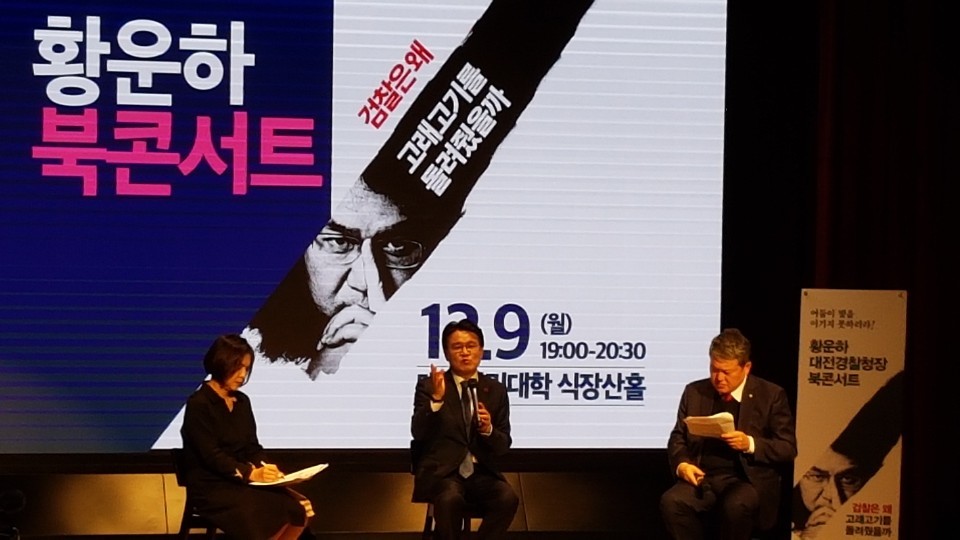 |
Hwang Un-hah (center), commissioner of the Daejeon Metropolitan Police Agency, speaks at an event held to mark the release of his book and to discuss prosecution reform in his hometown of Daejeon on Dec. 9, 2019. (Choi Si-young/The Korea Herald) |
DAEJEON -- A prosecution with only the power to indict is what we see in developed countries, Hwang Un-hah, commissioner of the Daejeon Metropolitan Police Agency, said Monday.
“Besides indicting, our prosecutors go on investigating numerous cases they either shouldn’t or needn’t,” Hwang said at an event marking the release of his book, which explores the much-debated prosecution reform. Checks and balances are not found in the prosecution, he added.
The commissioner, who stands accused of having launched a probe to influence the 2018 Ulsan mayoral election in Cheong Wa Dae’s favor, said prosecutors framed him in the election scandal. He said, “Prosecutors draw up a conclusion of how their investigation should go. They make sure they see to that end.”
Hwang referred to a suspicious suspension of a case in which prosecutors returned seized whale meat to the seller before checking thoroughly to determine whether the meat was obtained illegally. Hwang claimed prosecutors and the suspect’s prosecutor-turned-attorney traded favors.
“The whale meat case is just one of many examples that demonstrates prosecutors are abusing their investigative power. That’s a threat to democracy,” Hwang said.
Hwang supported a new independent anti-corruption agency that would investigate corruption allegations involving senior public officers, including prosecutors. The ruling Democratic Party of Korea floated the idea, but the main opposition Liberty Korea Party along with minor conservative parties fiercely opposes it.
“It should be three ways: police investigate, prosecutors indict and courts rule. We don’t see it now but we should,” Hwang said, referring to the overlapping investigative powers of the police and the prosecution. He maintained that the proposed body is necessary to check the prosecution’s power.
The commissioner argued stripping the prosecution of the investigative powers would not empower police instead, as some critics and conservative supporters claim so. Prosecutors should not have had those powers in the first place, he said.
He called for decentralizing the prosecution’s power even more, saying that the delegation of such power to other government bodies, such as the Fair Trade Commission, would help restore the principle of checks and balances in the country’s law enforcement.
Hwang, who asked police to honorably discharge him a month earlier to run in next year’s general elections on the ruling Democratic Party of Korea’s ticket, has yet to receive approval. Police are refusing his request because he is under investigation for allegedly abusing power to influence the Ulsan mayoral election in 2018.
By Choi Si-young (
siyoungchoi@heraldcorp.com)







![[Today’s K-pop] Blackpink’s Jennie, Lisa invited to Coachella as solo acts](http://res.heraldm.com/phpwas/restmb_idxmake.php?idx=644&simg=/content/image/2024/11/21/20241121050099_0.jpg)
